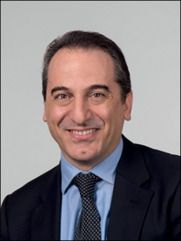10-Year RCT Analysis Suggests Metabolic Surgery Bests Medical Therapy for T2D Control
Data from a 10-year follow-up analysis of a single-center RCT in Europe is offering insight into the effects of metabolic surgery versus conventional medical therapy for long-term control of type 2 diabetes.
Francesco Rubino, MD

Data from a follow-up analysis of a randomized controlled trial suggests undergoing weight loss surgery could be a more effective strategy than conventional medical therapy for long-term control of type 2 diabetes.
A 10-year follow-up of a trial comparing metabolic surgery to medical therapy in patients with type 2 diabetes, results suggest undergoing metabolic surgery could be more effective than conventional medical therapy at facilitating long-term control of type 2 diabetes, with 37.5% of patients undergoing surgery maintaining an HbA1c under 7.0% at 10 years.
"The findings from this study provide the most robust scientific evidence yet that full-blown type 2 diabetes is a curable disease, not inevitably progressive and irreversible. In addition, to represent a major advance in the treatment of diabetes, metabolic surgery is our best lead to the elusive cause of the disease,” said Francesco Rubino, MD, Chair of Bariatric and Metabolic Surgery at King's College London, in a statement.
With an interest in describing the effects of conventional therapy versus metabolic surgery, Rubino and a team of colleagues performed a follow-up analysis of a randomized clinical trial they had previously conducted at a hospital in Rome, Italy. The trial randomized a cohort of 60 patients in a 1:1:1 ratio to undergo Roux-en-Y gastric bypass (RYGB), biliopancreatic diversion (BPD), or medical therapy plus lifestyle interventions. The primary endpoint of the trial was remission of diabetes at 2 years.
For inclusion in the original trial, patients needed to be 30-60 years of age, have a BMI of 35 kg/m2 or greater, a history of type 2 diabetes lasting at least 5 years, and an HbA1c greater than 7.0%. As part of the trial design, participants took part in scheduled visits at baseline, and at 1, 3, 6, 9, and 12 months, every 6 months until 60 months, and every year after.
The primary outcome of the current analysis was the durability of diabetes remission at 10 years. Investigators defined remission of diabetes as the combination of fasting plasma glucose less than 100 mg/dL and HbA1c less than 6.5% without ongoing pharmacological therapy for at least 1 year.
Of the 60 patients who underwent randomization, 57 had data available from 10-year follow-up visits. When examining those undergoing surgery, investigators found 37.5% maintained diabetes remission throughout the 10-year period. In intention-to-treat analyses, 10-year remission rates were 5.5% (95% CI, 1.0-25.7) for medical therapy, 50.0% (95% CI, 29.9-70.1) for BPD, and 25.0% (95% CI, 11.2-46.9) for RYGB (P=.0082).
At 2 years, 34 participants from the entire study cohort had achieved remission, but investigators noted 20 individuals from this group had a relapse of hyperglycemia during the follow-up period. However, investigators pointed out all individuals with relapse tainted adequate glycemic control at the 10-year follow-up.
Further analysis revealed those undergoing RYGB or BPD had fewer diabetes-related complications than those in the medical therapy group (RR, 0.07; 95% CI, 0.01-0.48). Of note, serious adverse events occurred more often in the BPD group versus medical therapy (OR, 2.7; 95% CI, 1.3-5.6), but this increased risk was not observed when comparing the RYGB group to medical therapy (OR, 0.7; 95% CI, 0.3-1.9).
"These data corroborate the notion that surgery can be a cost-effective approach to treating type 2 diabetes. The evidence is now more than compelling that metabolic surgery should be considered as a main therapeutic option for the treatment of patients with severe type 2 diabetes and obesity,” added Rubino.
This study, “Metabolic surgery versus conventional medical therapy in patients with type 2 diabetes: 10-year follow-up of an open-label, single-centre, randomised controlled trial,” was published in The Lancet.